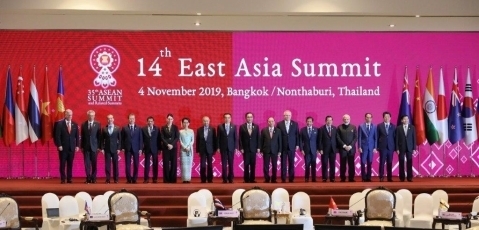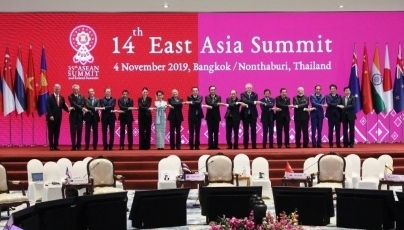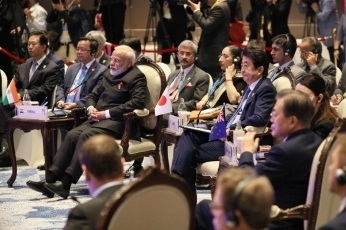Asia
The 14th East Asia Summit
November 4, 2019
 Photo: Cabinet Public Relations Office
Photo: Cabinet Public Relations Office
 Photo: Cabinet Public Relations Office
Photo: Cabinet Public Relations Office
 Photo: Cabinet Public Relations Office
Photo: Cabinet Public Relations Office
On Monday, November 4, from 1:55 p.m. to 4:25 p.m. (local time), the East Asia Summit (EAS) was held in the Kingdom of Thailand. Mr. Abe Shinzo, Prime Minister, attended from Japan. The overview of the meeting is as follows.
1 Review and future direction of EAS cooperation
At the outset, Prime Minister Abe noted that his attendance at the past seven EAS has made him realize no conference is as important as the EAS, as a forum for leaders to discuss and address issues facing the political and security situations in the region. Prime Minister Abe then stated the following.
(1) Free and open Indo-Pacific
i. Prime Minister Abe stated the following.
- It is epoch-making that ASEAN announced the “ASEAN Outlook on the Indo-Pacific (AOIP)” this year, demonstrating its unity and centrality.
- This year is the inaugural year of free and open Indo-Pacific of ASEAN, by ASEAN, and for ASEAN.
- As a free and open Indo-Pacific based on the rule of law is a foundation for peace and prosperity in the region, Japan fully endorses AOIP. Japan will cooperate with ASEAN toward materializing AOIP, by achieving synergies with the “Free and Open Indo-Pacific” concept advocated by Japan.
- With a view to achieving the principles enshrined in AOIP, Japan, more than ever before, will cooperate in various areas with all countries that share its visions. They include strengthening maritime security based on the rule of law, enhancing connectivity through quality infrastructure, and sustainable use of marine resources including combatting illegal fishing.
ii. Many participating countries expressed positive evaluations of AOIP that ASEAN announced this year.
(2) Sustainable economic development
i. Prime Minister Abe stated the following.
- Another foundation for peace and prosperity in the region is open and fair economic order based on international rules. At the G20 Summit in Osaka which I chaired this year, we reaffirmed the fundamental principles of free, fair, non-discriminatory, transparent, predictable and stable free trade and investment environment.
- The “G20 Principles for Quality Infrastructure Investment” confirmed the importance of such elements as openness, transparency, economic efficiency, and debt sustainability. The implementation of quality infrastructure investment in accordance with these principles will contribute to sustainable economic growth. Japan will continue to fulfill a leading role in this regard.
- Japan has been providing LNG supports to ASEAN countries through efforts such as human resource development and infrastructure development. Japan will promote improvements in energy access and resilience, diversification of energy sources, and cleaner energy technologies. Through such measures, Japan will contribute to ensuring energy security in the region.
- The progress made in the negotiations for the Regional Comprehensive Economic Partnership (RCEP) is a significant outcome amidst the protectionist trends. Japan will continue to aim to steadily implement and expand the Trans-Pacific Partnership Agreement (TPP11) and reach an agreement on RCEP as early as possible among 16 countries, including India.
- Through the “Osaka Track” and reform of the World Trade Organization (WTO), Japan will make maximum use of the Economic Research Institute for ASEAN and East Asia (ERIA). At the same time, Japan will promote a free and fair economic order in the region.
ii. In response, many countries noted on the importance of the free trade system.
2 Regional and international affairs
(1) South China Sea issue
i. Prime Minister Abe stated the following.
- Regional peace and prosperity are being challenged, and Japan shares serious concerns with the EAS participating countries.
- Japan is strongly opposed to all unilateral attempts to change the status quo as well as acts of intimidation against other parties. Japan urges demilitarization of disputed features and peaceful resolution of disputes in accordance with the United Nations Convention on the Law of the Sea (UNCLOS).
- Japan strongly expects that a effective and substantive Code of Conduct in the South China Sea (COC). It shall conform with international law and not infringe on the legitimate rights and interests of all parties.
- Japan fully supports the fundamental principles advocated by ASEAN, such as “full respect for legal and diplomatic processes,” “freedom of navigation and overflight,” and “importance of de-militarization and self-restraint.”
ii. In response, many participating countries mentioned the importance of the freedom of navigation and overflight, compliance with international law, and peaceful resolution of disputes. Many views were expressed that the COC should be consistent with international law.
(2) North Korea issues
i. Prime Minister Abe stated the following.
- North Korea’s repeated launches account to more than 20 times since the beginning of this year. It is clear that their purpose is to improve its missile technology. On October 2, the ballistic missile launched by North Korea, which appears to be a submarine-launched ballistic missile (SLBM), landed inside Japan’s Exclusive Economic Zone (EEZ).
- The ballistic missile launches by North Korea are clear violations of United Nations Security Council (UNSC) resolutions. Japan strongly condemns the launches, which seriously threaten the peace and security of not only Japan but also the region.
- Japan fully supports U.S. efforts toward the complete denuclearization of North Korea.
- It is important that the international community remains united to support the U.S.-North Korea process in order to achieve the complete, verifiable, and irreversible dismantlement (CVID) of all weapons of mass destruction and ballistic missiles of all ranges of North Korea in accordance with the UNSC resolutions.
- Specifically, it is critical to maintain full implementation of the UNSC resolutions, including countering “ship-to-ship transfers”.
- Japan hopes that participating countries will continue to cooperate toward the early resolution of the abductions issue.
ii. In response, many participating countries noted on the importance of peaceful resolution through complete denuclearization and dialogue. Several countries condemned the missile launches and mentioned the importance of North Korea’s compliance with UNSC resolutions.
(3) Situation in Rakhine State
Prime Minister Abe stated the following.
- The international community should continue to support the repatriation of displaced persons, along with continuing its supports in Bangladesh. It is also important that the international community coordinates with ASEAN.
- With regard to the alleged human rights violations, Japan strongly expects the Myanmar government and military to take appropriate measures.


